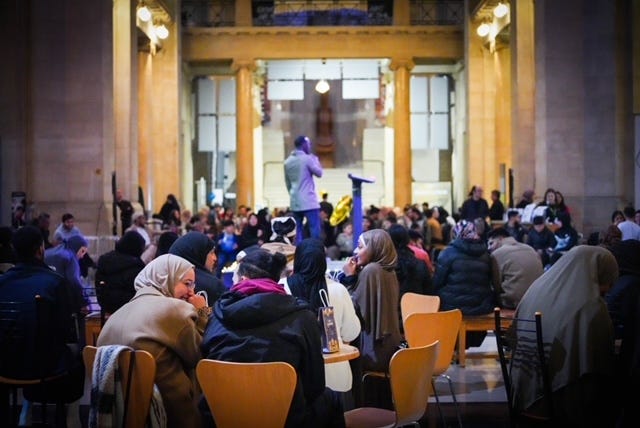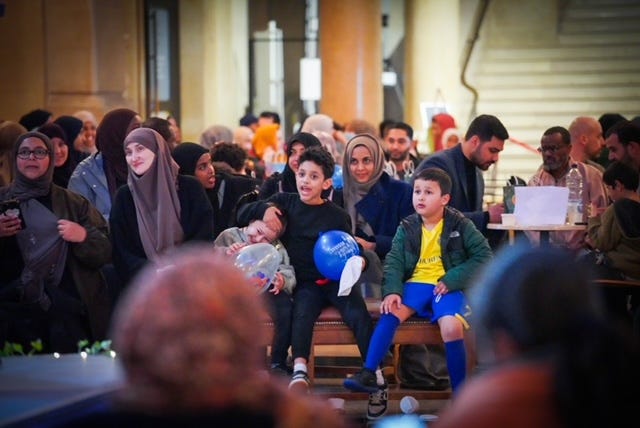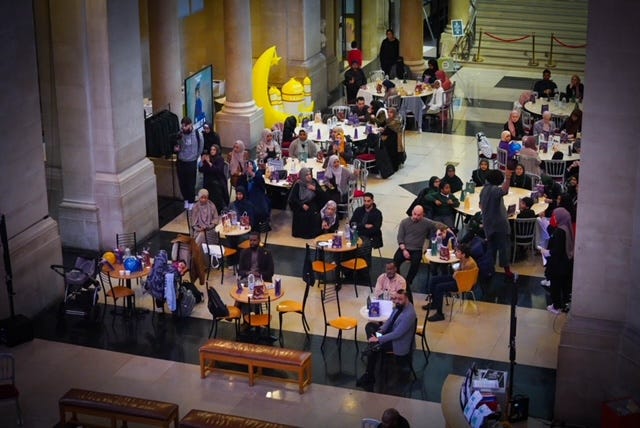Ramadan in Wales: the radical act of inviting a Muslim for Iftar
To mark Eid, and the end of the Muslim holy month of Ramadan, Mariyah Zaman writes about events that have taken iftar meals into new places in Wales this year
‘Not even water?’ The most popular question Muslims are asked on the observance of Ramadan each year. What is Ramadan? Is it truly the hunger games as people make it out to be, especially when a day of fasting typically lasts up to sixteen hours for Muslims in Wales. If so, why the collective sadness amongst Muslims across the globe on the departure of the Islamic month of Ramadan?
Contrary to popular belief, Ramadan is one of the most anticipated times of the year for Muslims – a detox for the soul some may say. Sitting as the ninth month in the twelve-month Islamic calendar, Ramadan lasts around 29 or 30 days and is marked by the sighting of the moon. Ramadan doesn’t sit during the same time period each year, as the Islamic calendar follows the lunar cycle, thus each year the month of Ramadan starts roughly ten days earlier than the last.
This year, many Muslims in Wales felt the coolness of the shorter spring-time fasts – in contrast to the years when fasting took place during British summer time. Breaking fast at around 6:30pm this year feels like a breeze in contrast to the 9:00pm fasts of my youth.
A day of fasting lasts from dawn to sunset, constituting abstinence from all food, drink, sexual relations and engaging in negative behaviours. As an example of refrain from negative behaviours: if someone starts to strike an argument with me during Ramadan, my response will be ‘sorry I’m fasting, I can’t engage in this,’ although that’s not the easiest if you ask my younger sister.
There are some categories of people who are exempt from the obligatory fasts during this season, including children, nursing or pregnant women, diabetics, those that require medicine as part of their daily routine and women during menstruation. So, if you see a Muslim eating a croissant in the street during daylight hours, it’ll probably be down to one of those reasons.
A misconception about Ramadan is that it’s a time of celebration, however; I like to call it a time of observance. A lot of Muslims describe the month as a period to refuel, detox and prepare for the rest of the year: to strive, and to become the best version of oneself during an act of great self-discipline. Essentially, if one has the ability to abstain from the necessities of life for a whole month for the sake of Allah (God) - then succumbing to temptations and desires for the rest of the year becomes less challenging.
Aside from the points of abstention, Ramadan is also a month of giving. In recent years, a report by Muslim Charities Forum found that British Muslims donated around £130m during one month of Ramadan alone, with this figure set to rise annually since the pandemic with the impact of social gatherings resuming in-person.
After a long day of fasting, Muslims gather to break their fast with an iftar meal. It’s highly encouraged to feed a person who is fasting, and some mosques in Wales provide free hot meals every day for the entirety of the month to anyone who walks through their doors for an iftar. I often prefer to have iftar with my family, but sometimes I’ll help out at my local mosque in Cathays, Cardiff where we pack an average of 150 hot meals to serve the community for that evening.
Islam is currently Britain’s second largest religion. With Cardiff being a port city historically, the majority of Muslims in Wales reside in the Welsh capital with the second and third largest populations of Welsh Muslims residing in Newport and Swansea. According to the 2011 Census, Muslims only make up 2.1% of the Welsh population, a contrast to the 6.4% of Muslims in England. As such, the struggles that come with being a minority are more keenly felt – institutionally and in matters of resource, in contrast to neighbouring regions.
Ramadan is a time where the Muslim identity is practised most visibly. In Cardiff, City Road will likely be packed with gatherings where all the chai and dessert places will be full with people relaxing and catching up after observing lengthy taraweeh prayers after iftar which fill the mosques each night.
This year, I organised an iftar at the National Museum of Cardiff and another at Chapter Arts Centre, the first time in their histories that these venues had hosted such events. With combined attendance of 300 people and a waiting list of over 100, and people from different communities sitting together in secular institutions at a time where division is rife in the world, these became significant moments of culture that I hope to see more often.
As a member of a minority group, I’m a true believer that in order to be inclusive as an institution it’s important that under-served communities are radically invited. An iftar is an opportunity to do that and it became a poignant moment for many Muslims, hearing the call to prayer in some of Wales’ most-visited cultural institutions.
As the co-founder and creative director of Now In A Minute Media, an independent media platform that champions Welsh Muslim voices and encourages participation in creative industries, we deliberately challenged and offered our local cultural institutions to host an iftar.
Last year, we also collaborated with the Wales Millennium Centre to host an iftar – which became a talking point in the area and institution throughout the year.
Why the buzz? What is the significance of people breaking fast together in spaces that are not typically known for hosting Muslim communities in Wales?
For Muslims, attention to care and preparation of the iftar is a much bigger deal than simply throwing together some ingredients for a meal. It’s an intimate moment, between you and your Lord, to reflect and have those last few moments before your first sip of water since dusk and before the first bite in the customary eating of the date as the call to prayer echoes around you. Then it follows with prayer, eating the meal and back again leaving to pray.
When a secular institution offers their space to host such an intimate moment, and offers a space to feed a community, for one evening they become part of the very ethos of what Ramadan is about. Charity, giving, community and closeness to God.
Something that’s become a tradition at our iftars is asking a member of the institution to fast for the day with us and reflect on their experience on stage as part of the programme. It becomes an educational experience for both Muslims and non-Muslims. We also include a viewing area for non-Muslims to observe the congregational prayers, which during our last iftar one non-Muslim told me was an emotional moment for them to observe and be a part of. Some Muslims have expressed that these events were the best cultural iftar events they had ever attended in their lifetime; despite the institution only having been walking distance from their homes, being part of the spaces they have always lived near felt like finally being included in the areas they call home.
Muslims believe that when one part of the ummah (global Muslim community) hurts, we all hurt. Killings and the mass displacement of people, particularly in Palestine and Sudan, have taken a heightened toll on Muslim communities in Wales. One of our volunteers, who is Welsh Palestinian lost 17 family members in one night, wiping a whole generation as a result of the Israeli bombardment in Gaza. Grief and the loss of hope are emotions demonstrated in weekly protests from people of all backgrounds across Wales and the world calling for ceasefires that have since become part of people’s weekend routine for the last six months.
Many of the Welsh Muslim artists and speakers we invited to our community iftars decided to include a message of acknowledgement in their creative expressions to Gaza or Sudan. When some institutions across the UK have cancelled events that platform Palestinian voices to avoid contention, being allowed to fully express oneself in such a time has become an act of radical inclusion.
The impact of community iftars being hosted in mainstream institutions in Wales against this backdrop, then becomes a small beacon of light that demonstrates how, irrespective of difference, unity is possible.
As Ramadan ends this year, you will see Muslims across Cardiff dressed in colours and diverse cultural outfits on the day of Eid Al-Fitr. It’s not an unusual occurrence for me in Cardiff if I pass a non-Muslim stranger on Eid day in the street seeing me in my blingy shalwar kameez shout ‘Eid Mubarak’ from across the road.
The significance of cultural institutions making space for communities like mine that are not represented in the mainstream are that they host spaces to allow a rare emotion that mainstream discourse leaves out; empathy.
As part of my work at Now In A Minute Media, I’m passionate to be part of what I hope to see in being a greater cultural shift in Wales to understand what it truly takes to host people to allow more empathy in today’s climate. Producing stories written by Welsh Muslim creatives like The Son And The Moon is another example of how I’m working to promote the authenticity of what being part of Welsh culture looks like, void of the echo chambers we see online, cutting through the noise of algorithms and allowing Muslim communities express fully as they are.
Wales is a nation that can take great pride in its customs and traditions, including the welcoming nature of its culture. Thus, despite the journey Welsh institutions have to go on extending historically white spaces to minority communities being able to exercise my identity this year unapologetically as a Welsh Muslim during an evening in Ramadan in these institutions demonstrates what I hope is the beginning of a shift. I want to live in Wales where it no longer becomes a talking point for my local institutions to host an iftar or Eid celebration but rather for this inclusion to be part of the institution’s regular practice. As the cultural sector faces a budgeting crisis in Wales, I believe that in order for culture to be preserved it must be created.
Mariyah Zaman is Creative Director of Now in a Minute Media.







